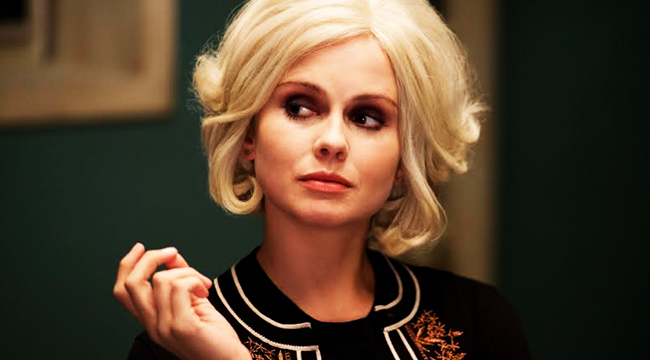
It can be thrilling when a veteran TV series blows up its status quo, but it can also be scary. A new direction is promising, especially if you’ve been watching the old one for a while, but chances are you watched the old one for as long as it did because it worked. Who knows if the reinvention will be nearly as appealing? For that matter, if you’re someone who makes the show, will the new idea be easier because it won’t force you to repeat yourself as much, or will it be a headache because you can’t rely on all the old tricks you learned so well by now?
The CW’s iZombie appeared to explode its original premise but good at the end of its third season. What had mostly been a crime procedural with a supernatural twist — medical examiner Liv Moore (Rose McIver) is secretly a zombie who helps cop Clive Babineaux (Malcolm Goodwin) solve murders by eating the brains of the victims and temporarily assuming aspects of their memory and personality — radically transformed itself by turning a large chunk of the Seattle population into zombies and revealing the truth about the undead to the entire world. This was such a big event that surely iZombie couldn’t remain the show it had been for three years, right?
As Blaine (David Anders), the zombie gangster who’s been causing trouble for Liv and friends since the start of the series, puts it at one point in the fourth season (which premieres tonight at 9), “We live in a zombie city now. All bets are off. Up is down. Black is white.”
But a moment later — neatly summing up the creative struggle that can be glimpsed throughout the five episodes the CW sent to critics — he adds, “But don’t tell that to the Seattle PD. No, it’s business as usual over there.”
So on the one hand, the show’s Seattle has been radically transformed. Fillmore Graves, the mercenary company that infected the population to protect its own zombie employees, has erected a wall around the whole city; they now serve as Seattle’s army, and their boss Chase Graves (Jason Dohring) as its semi-benign dictator. The 10,000 or so zombies openly but uneasily co-exist with all the humans who didn’t leave before the wall went up, with the brain supply running dangerously thin and everyone afraid the US government might simply nuke the city to eliminate the zombies once and for all, while an illicit coyote economy thrives by both smuggling out humans who want to leave and smuggling in sick people who want to be scratched and zombified to survive. There’s even zombie-on-zombie tension, as Blaine’s father Angus (Rober Knepper) emerges from the underground well his son trapped him in, now spouting religious doublespeak and starting up a cult opposed to Fillmore Graves.
But on the other hand, Liv, Clive, and Liv’s boss Ravi (Rahul Kohli) still solve murders every week, at times involving victims and suspects acting roughly the way they would in a pre-zombie world. The new season spends a lot of time on the stresses brought on by the brain shortage, and how everything’s being rationed, yet Liv’s still able to enjoy an entire brain to herself each time, the better to let Rose McIver adopt a new persona (a hockey goon, a snobby old rich woman, a hopeless romantic) and maintain the show’s core gimmick. Everyone now knows about zombies, and about the visions they have from the brains that they eat, yet the murder victims’ friends and family rarely seem to notice or care that an avatar of their late loved one is standing right in front of them.
It’s easy to understand the reticence of the creative team to abandon this foundational piece of the show’s structure. McIver’s a lot of fun playing these broad character types — as are her co-stars when they get their own chances, like an upcoming episode where Major (Robert Buckley) eats the brain of a pro wrestler and talks like Macho Man Randy Savage for a while — and she, Kohli, and Goodwin all have excellent chemistry to go with the snappy banter the writers give them. If anything, the procedural stuff is more entertaining in recent years because Clive knows Liv is a zombie, a detail that’s unlocked a lot of comic potential within Malcolm Goodwin. And having that clear, standalone element in every episode is really valuable on a show whose ongoing story arcs can occasionally verge on migraine-inducing in their contortions.
But the start of the new season hits a lot of bumps as it tries to simultaneously show how everything has changed and nothing has, as if the show is having second thoughts about the new Seattle — or at least wants to very carefully ease the audience into it. The dialogue’s still sharp, and the performers appealing, but the tug of war between what the show was and what it probably needs to be now is palpable, and at times distracting.
The fifth episode, though, suggests the old version of iZombie really might get left behind, as the situation becomes perilous enough that Liv, Major, Chase, and several other characters all make big moves from which there seems little point of return, all while questioning the point of continuing to do things the way that everyone’s used to. Even Liv asks at one point, “What we do — solve crimes — why bother?”
It may be that what iZombie evolves into isn’t as appealing as what the show used to be. But it’s already changed too much to revert to form now. Hopefully, that fifth episode suggests that the show, along with its characters, is committing to this strange new world order.
Alan Sepinwall may be reached at sepinwall@uproxx.com. He discusses television weekly on the TV Avalanche podcast. His new book, Breaking Bad 101, is on sale now.
